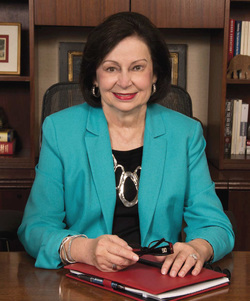Message from the Dean
|
Milla Boschung, Ph. D.
|
WE LEARN BY DOING
The concept of learning through experience is old. As early as 350 BCE, Aristotle wrote, “for the things we have to learn before we can do them, we learn by doing them.” Experiential learning focuses on the individual, rather than a group. Students take a very active role. They experiment, make discoveries and develop firsthand knowledge outside the traditional academic setting. As a result, they gain a deeper understanding of the new knowledge and retain it longer. Learning in this way can be through internships, entrepreneurial ventures, undergraduate research, study abroad and other professional opportunities. The most effective activities are well–planned, supervised and assessed. A key component of this method of learning is reflection based on observation. The student notes what works and what doesn’t, and considers what can be improved the next time. Each experience helps inform those that follow. In the process, students strengthen their skills in decision-making and problem–solving and sharpen their judgment. They develop leadership abilities and learn more about career possibilities. The University of Alabama is in the midst of a five-year Quality Enhancement Plan focused on improving students’ real-world, problem-solving skills. The plan raises the bar on experiential opportunities and encourages the creation of new ones. CHES has always offered opportunities to learn through experience, so this focus suits our college well. In our programs, experiential learning enables students to reflect on and apply what they learn in the classroom. Instructors inspire students to innovate and experiment with knowledge both in and out of class. In this issue of REUNION, you will read about some of these learning experiences, from creating a nonprofit to save elephants to using music to strengthen the development of homeless children. We’re so proud of our students and the initiative they take again and again to gain real-world experience, often serving others in the process. |


